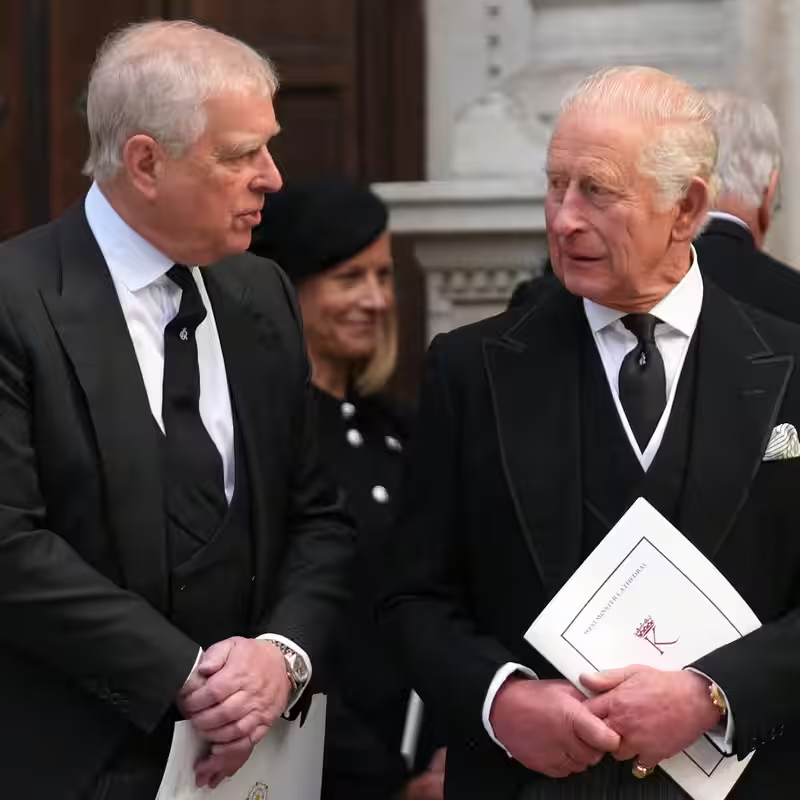King Charles has taken a bold and unprecedented step in modern British monarchy by stripping his younger brother, Prince Andrew, of his royal titles. In a move that signals a new era of accountability, Andrew will no longer be known as His Royal Highness or the Duke of York. Instead, he will revert to the private name Mr. Andrew Mountbatten-Windsor—a dramatic fall from grace for a once-prominent royal figure .
Table of Contents
- A Historic Decision by King Charles
- Why Now? The Epstein Scandal Revisited
- Inside the Royal Family Fallout
- How the Titles Were Legally Removed
- Public and Political Reaction
- What’s Next for Andrew and the Monarchy?
A Historic Decision by King Charles
On October 31, 2025, Buckingham Palace announced that King Charles III had formally requested the removal of all royal titles held by Prince Andrew. This includes the prestigious Dukedom of York, the style of “His Royal Highness,” and his status as a prince of the realm. The decision marks the most severe disciplinary action ever taken against a senior royal in modern times.
According to palace insiders, the king consulted both the government and his immediate family—including Queen Camilla and Prince William—before making the final call. All reportedly backed the move as necessary to preserve the integrity of the Crown.
Why Now? The Epstein Scandal Revisited
The catalyst for this historic decision traces back to Andrew’s long-standing association with convicted sex offender Jeffrey Epstein. Despite repeated denials, Andrew has faced serious allegations—including from Virginia Roberts Giuffre, who claimed in her memoir Nobody’s Girl that he sexually abused her when she was a minor. Giuffre died by suicide in April 2025, reigniting public outrage.
For years, the palace opted for half-measures: Andrew was removed from public duties in 2019 after a disastrous BBC interview, but retained his titles. That changed as pressure mounted from lawmakers and the public alike. Earlier this month, Labour MP Rachael Maskell introduced a bill to give the monarch explicit power to revoke titles—a move King Charles appears to have preempted through legal channels.
Inside the Royal Family Fallout
Though Charles and Andrew were never particularly close, the decision was emotionally fraught. Palace sources describe the king as “anguished” over the human cost—but resolute in his belief that the monarchy’s survival depends on accountability.
Andrew’s ex-wife, Sarah Ferguson, will not accompany him to his new residence. The couple, divorced since 1996 but still cohabiting at Royal Lodge, will now part ways. Their daughters, Princesses Beatrice and Eugenie, however, will retain their titles—a sign the punishment is targeted, not generational.
How the Titles Were Legally Removed
King Charles bypassed Parliament by sending royal warrants to David Lammy, the Lord Chancellor and Justice Secretary. As custodian of the Peerage Roll—the official registry of British nobility—Lammy is expected to swiftly remove Andrew’s entries, effectively erasing his aristocratic status without legislative debate.
This legal maneuver avoids a messy parliamentary showdown while still delivering decisive action—a testament to the king’s growing political acumen.
Public and Political Reaction
The response has been overwhelmingly supportive across party lines. Trade Minister Chris Bryant called it “a necessary step,” while Conservative leader Kemi Badenoch stated bluntly, “The public has no truck whatsoever with sexual abuse, especially of minors.”
Liberal Democrat leader Ed Davey added that Andrew’s position had become “totally untenable,” and that this move is “an important step toward rebuilding trust in our institutions.”
What’s Next for Andrew and the Monarchy?
Andrew is set to leave Royal Lodge, his lavish 30-room home near Windsor, and relocate to a smaller property on the Sandringham Estate—land personally owned by the king. Though he reportedly invested £8 million in renovations, the Crown Estate is negotiating compensation to end his “peppercorn rent” lease.
For King Charles, this moment may define his reign. Long seen as a cautious reformer, he has now demonstrated that even blood ties yield to institutional duty. In doing so, he may have secured the monarchy’s relevance in an age that demands transparency and justice.




